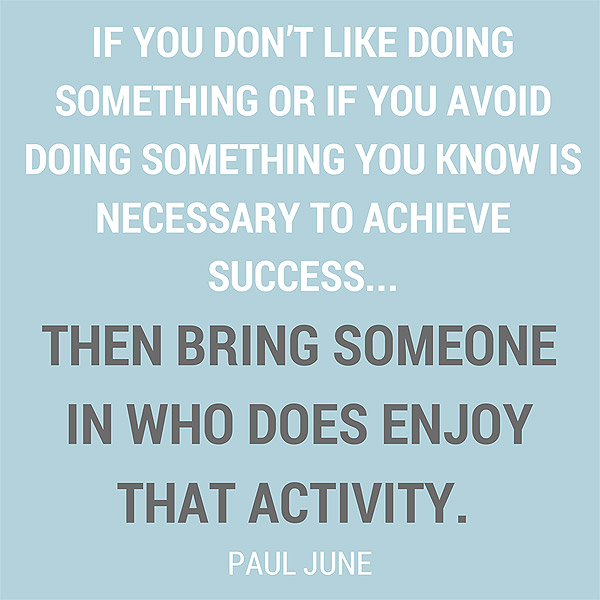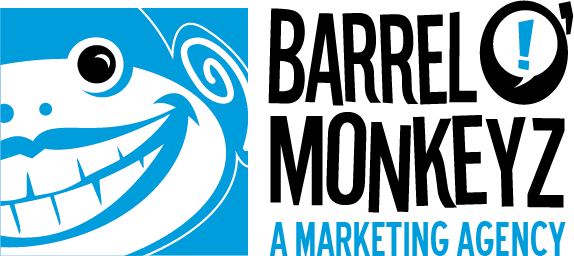We’ve all been there. In fact, we’re all probably still “there” to some extent, at least on occasion. In business and in life, there are just some things we love to do and some things we abhor—even if we’re good at them.
Take me, for example. On the domestic front, the laundry and I just don’t get along. Never have, never will. Can I do the laundry? Sure, but I do it begrudgingly. If it can be avoided, it will be. Put me in a store, though, on the trail of the next big bargain or on the hunt for something hard-to-find or hard-to-get, and I’m all over it. If there’s a yard to be tended, I’m there, too.

On the business front, I’m a people person. I’ve said it before and I’ll say it again, nothing gets my gears going more than “shaking hands and kissing babies.” But tie me to a desk, pouring over emails or staring at computer code all day, and my energy and enthusiasm levels fade fast. It’s not that I can’t do it or won’t do it—I’m actually quite good at crunching numbers, analyzing reports, and cracking the mysteries of computer code—but it’s just not something I look forward to or gain energy from.
You probably experience times when everything seems to go right. You feel good, your energy is high, and the results or experiences you most desired just keep coming in. Whether you realize it or not, chances are you are operating within your wheelhouse—leveraging your strengths, preferences, and gifts and doing things you enjoy and that you are good at.
Conversely, you probably experience times when nothing seems to go right. From relationships to business arrangements, the results just aren’t there and every moment is a struggle. When this happens, you’re most likely either operating outside of your wheelhouse or choosing not to do something that needs doing because you do not like to do it.
My experience is that activities—whether personal or professional, from business deals and projects to relationships—that are not aligned with what’s in our individual wheelhouses tend to fail. For whatever reason, we avoid these activities even if we know we should do them, because either we don’t like them, they drain our energy, or we’re just not good at them.
Yet we all know that sometimes you just have to do some things you don’t like, whether it’s pouring over a stack of boring business reports or spending a night at the opera (or the opposite, if these activities are in your wheelhouse). Does this mean then, ultimately, we are doomed to fail at something that doesn’t play to our strengths?
Hardly.
As entrepreneurs and individuals, we benefit from knowing what our strengths are (not what we “wish” they were, but a realistic assessment!). Armed with this knowhow, when a challenge or opportunity presents itself, we can craft a solution that aligns with what’s in our wheelhouse, rather than one at odds with it. If we do that, chances are we’ll be more apt to engage, follow-through, and achieve the success we want. Otherwise, we’ll experience starts and stops, and lots of initiatives and relationships that simply seem to go nowhere fast or wither on the vine.
Sure, there will be times when our strengths and preferences won’t be enough, when what we’d like to be doing doesn’t match up with what needs to be done. In that case, should you just put your head down and plow forward anyway, hoping for the best, even though you know your head and your heart are just not into it? Or should you simply ignore what you know is the right strategy or tactic and go ahead with what you like to do best anyway, hoping the results will be there regardless of the approach you take?
Certainly, there must be another way.
There is. In fact, there are several:
- Come up with another approach—one that plays to your strengths and preferences. There is often more than one way to achieve a goal. So rather than developing strategies that rely on activities you do not like and will avoid, focus on solutions/approaches that lie within your wheelhouse. For example, if you hate cold calling, don’t embark on a sales strategy that relies solely on cold calling. If you don’t like public speaking, don’t embark on a regional tour of chambers of commerce, trying to pitch your business concept. If you’re idea of a fun date night is “dinner and drinks” at a local eatery, don’t suggest a trip to the local art museum. You get the idea.
- Learn to enjoy those things that currently drain your energy . . . or at least tolerate them. That’s right. Just as you might have overcome a childhood dislike for broccoli or liver (OK, I know that’s a stretch), you can overcome your dislike for a certain activity. Quite often, we don’t like a certain thing because we either don’t know much about it, we haven’t been exposed to it, or we just haven’t dealt with it enough to be proficient. So take a class, read a book, or job shadow someone who likes/excels at a particular activity. You might never add said activity to your list of all-time favorites, but you may be able to turn your need to engage in it from time to time into an asset rather than a liability.
- If you don’t like doing something or if you avoid doing something you know is necessary to achieve success, then bring someone in who does enjoy that activity. If you hate crunching numbers, find someone who loves it. If you hate keeping your computer technology up-to-date and virus-free, look to someone with those skills in his or her wheelhouse. If cold calling gives you hives, bring a sales person in who can’t get enough of it. If your writing makes Dick and Jane seem like college prose, hire a writer. As an entrepreneur, you may think you have to and you can do it all, but you really don’t and you really can’t. Chances are the added costs of bringing in experts and specialists will pale in comparison to the costs of lost opportunities, poor results, and countless late nights spent banging your head against the wall. (Of course, this approach won’t necessarily help if “ballet night” with the spouse just isn’t your thing. For that, you may have to focus exclusively on Alternatives #1 & #2!)
Do you find yourself constantly operating outside of your wheelhouse? If so, it’s time to step back and take a look in the mirror.
- Is an alternative approach the answer for you?
- Do you need to learn a new skill?
- Or is the solution simply to bring in an expert to complement your skills and your existing team—or is it all of the above?
Share your thoughts and experiences here.

Trackbacks/Pingbacks